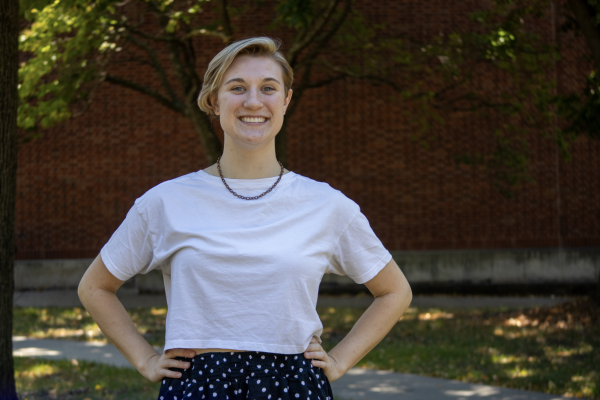Democratic Party candidate for Iowa Governor Deidre DeJear credits an unlikely combination of factors with propelling her to a career in politics: an education at Drake University and a childhood affinity for puzzles.
The 2008 journalism graduate “would not be running in this space” if not for Drake’s emphasis on community service – as well as a banking internship she was unexpectedly offered during an event in Parent’s Hall, which she says gave her the tools to start her own business.
“I bleed blue in more ways than one,” DeJear said.
Born in Jackson, Mississippi, DeJear moved to Iowa to attend Drake, where she majored in Broadcast News and Politics. Following graduation, Dejear founded and currently owns Caleo Enterprises, which assists small businesses and nonprofits in Iowa. She also co-founded Back 2 School Iowa, a nonprofit that aims to “leverage educational services, scholarships and resources.”
DeJear served as Obama’s African American vote director for America Iowa in 2012, five years after the Iowa Caucuses were held on campus.
“It was through volunteering during the Obama era, the first campaign in 2007, experiencing the Iowa Caucuses in Bulldog Theater, which is now Sussman, where I truly realized democracy can work,” DeJear said. “People who are unlikely partners, unlikely people to resolve issues together can convene for the sake of the common good.”
DeJear said Iowa is and has always been capable of making decisions for the “common good,” even when such decisions are unpopular.
Eighty-six years before Brown v. Board of Education declared segregation in schools unlawful on the national level, Iowa desegregated its educational system. Iowa legalized interracial marriage in 1851 and gay marriage in 2009, rights not acknowledged by Supreme Court decisions until 1967 and 2015, respectively. According to DeJear, these examples and more demonstrate Iowa’s capability to lead.
“Our state has a tendency to be the petri dish of progress,” DeJear said. “We make very unpopular decisions for the sake of humanity, the sake of people.”
Her nomination is yet another example of Iowa’s change-making streak, DeJear said. She is the first Black individual to ever be nominated to statewide office and the first Black woman to run for the Iowa governorship.
“This is a very unique path that we’re setting out here. And it’s not just new to us. It’s new to the press, new to our community,” DeJear said. “And that’s the biggest challenge – something that’s new, getting people accustomed to something that’s different.”
DeJear said that education reform is the issue closest to her heart. In describing her goals, she references a time when Iowa’s schools were “ranked first in the nation,” and she claims current governor Kim Reynolds is responsible for allowing Iowa’s public schools to slip to 20th in the nation.
“This state has led in education,” DeJear said. “We have an expectation in the state to lead and we’ve got to get back to leading.”
DeJear’s other campaign issues include reproductive rights, healthcare and mental healthcare, gun safety and cannabis. She said she’s running for governor because Iowans are “working too hard” to make a living, access healthcare and pay for higher education.
“What’s leading me in these moments to not only run for governor but to stay involved in politics is that it’s an avenue to problem solve,” DeJear said. “We’ve got a lot of hurting people across our state. That’s the other part. Got a lot of hurting people across our state, and we can’t give up on them. We don’t want them to give up on themselves, and more importantly, we don’t want them to give up on our state.”
Despite her assertion that Iowans are struggling, DeJear urges potential voters not to lose hope.
“Obviously, I want folks to vote for me, but it matters more that people are using their voice,” DeJear said. “We cannot give up on democracy. I know sometimes we believe that it’s too far gone–that the challenges are just too big to overcome. But we in this state have overcome challenges and harder tasks before, and we’re equipped for this. The state is not that far gone.”








